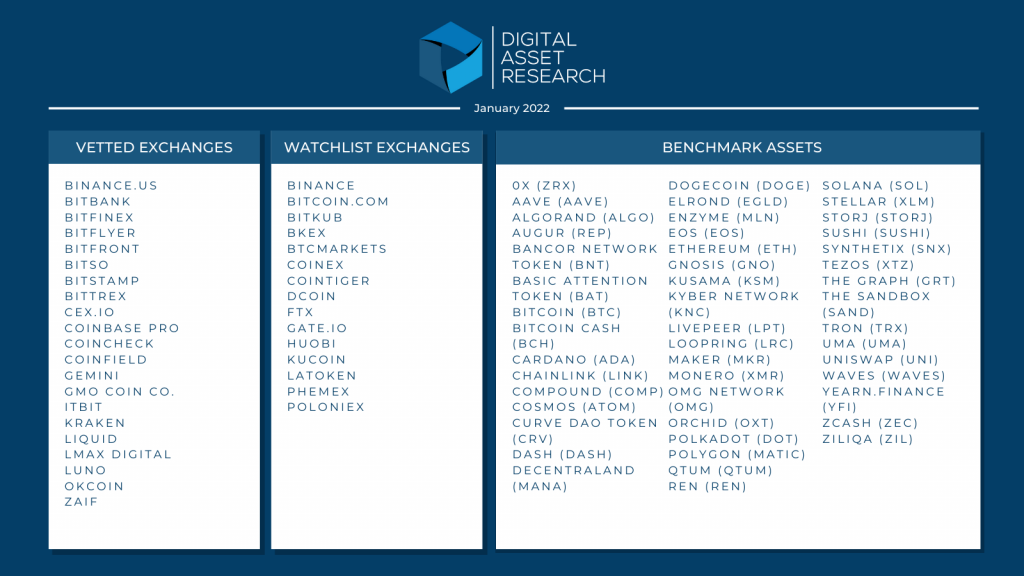DAR’s vetting processes bring institutional-level diligence to crypto markets and the latest vetting process results in 21 Vetted Exchanges, 15 Watchlist Exchanges, and 48 Benchmark Assets
New York, NY, January 20, 2022 – Digital Asset Research (DAR), a leading provider of crypto asset data and research, today announced the release of its January 2022 Crypto Exchange Vetting and Asset Vetting results. DAR’s vetting processes apply institutional-level diligence to digital asset markets to meet an industry-wide need for reliable crypto data in an environment where cryptocurrencies trade across hundreds of lightly regulated or unregulated exchanges.
Over 450 exchanges were evaluated to identify 21 Vetted Exchanges: Binance.US; bitbank; Bitfinex; bitFlyer; BITFRONT; Bitso; Bitstamp; Bittrex; CEX.IO; Coinbase Pro; Coincheck; CoinField; Gemini; GMO Coin Co.; itBit; Kraken; Liquid; LMAX Digital; Luno; Okcoin; and Zaif.
Fifteen exchanges are now considered Watchlist Exchanges for potential future inclusion on the Vetted Exchanges list: Binance; Bitcoin.com; Bitkub; BKEX; BTCMarkets; CoinEx; CoinTiger; Dcoin; FTX; Gate.io; Huobi; KuCoin; LATOKEN; Phemex; and Poloniex. Bidesk and BHEX were removed from the Watchlist as they are no longer operating.
The Asset Vetting process evaluated over 1000 digital assets to identify 48 benchmark assets and over 600 non-benchmark assets. In the latest evaluation, Compound (COMP), Gnosis (GNO), Livepeer (LPT), Waves (WAVES), and Zilliqa (ZIL) were added to the Benchmark Asset list. The Benchmark Asset list also continues to include 0x (ZRX); Aave (AAVE); Algorand (ALGO); Augur (REP); Bancor Network Token (BNT); Basic Attention Token (BAT); Bitcoin (BTC); Bitcoin Cash (BCH); Cardano (ADA); Chainlink (LINK); Cosmos (ATOM); Curve DAO Token (CRV); Dash (DASH); Decentraland (MANA); Dogecoin (DOGE); Elrond (EGLD); Enzyme (MLN); EOS (EOS); Ethereum (ETH); Kusama (KSM); Kyber Network (KNC); Loopring (LRC); Maker (MKR); Monero (XMR); OMG Network (OMG); Orchid (OXT); Polkadot (DOT); Polygon (MATIC); Qtum (QTUM); REN (REN); Solana (SOL); Stellar (XLM); Storj (STORJ); Sushi (SUSHI); Synthetix (SNX); Tezos (XTZ); The Graph (GRT); The Sandbox (SAND); TRON (TRX); UMA (UMA); Uniswap (UNI); yearn.finance (YFI); and Zcash (ZEC).

“As firms look at digital assets for investment and to build investment products on, our Exchange Vetting and Asset Vetting processes provide an important foundation for understanding the market,” said Doug Schwenk, DAR’s CEO.
The Exchange Vetting process combines quantitative and traditional qualitative due diligence to identify exchanges reporting accurate volumes and eliminate exchanges that are not appropriate for determining an accurate market price. During the Asset Vetting process, digital assets trading on Vetted Exchanges are evaluated to determine if they meet institutional investor standards for codebase construction and maintenance, community, security, liquidity, and regulatory compliance.
The results of the Exchange Vetting and Asset Vetting processes are used by DAR clients to determine accurate asset prices and to identify safe venues in the market. Results are also used for DAR Sector Indexes, the recently launched FTSE Bitcoin Index, FTSE Ethereum Index, and FTSE Cardano Index, as well as in the FTSE DAR Reference Price, a robust hourly reference price for digital asset market performance.
DAR’s data, pricing methodology, and asset taxonomy classifications are also used in the Bloomberg Galaxy DeFi and Solana indexes.
DAR performs its vetting processes quarterly. Results will next be announced in April 2022.
For further information, visit https://www.digitalassetresearch.com/.
